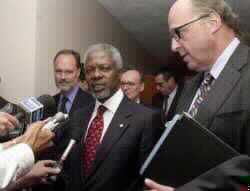Secretary-General Kofi Annan was seeking to clarify whether Saddam Hussein is prepared to accept the return of U.N. weapons inspectors under the conditions laid out by the Security Council. If Iraq agrees to the council's roadmap, Annan said, he would look at Iraq's invitation to chief weapons inspector Hans Blix to visit Baghdad for technical talks "in a different light." Annan planned to send a letter to Iraq on Tuesday.
Blix, who is vacationing in his native Sweden, told Swedish Radio on Tuesday that he found little new in the Iraqi letter.
"It's a rather tricky diplomatic language," he said. "But everything indicates, when you read it very carefully, that it is the same sort of setup as we've had during three rounds of discussions in New York in the spring."
Blix said inspectors would travel to Baghdad only if given assurance that they'll be allowed to conduct their work.
"We want discussions with them (the Iraqis) about practical arrangements: How we fly in, what authorities we deal with there," Blix said. "We don't want conflict once we're in."
Annan discussed the invitation from Iraqi Foreign Minister Naji Sabri with the 15 members of the Security Council at a private lunch Monday. He raised for the first time the possibility of the return of inspectors, who have been barred from Iraq for nearly four years.
"All members of the council agree that we should do everything to get the inspectors back, and if Iraq is open to that sort of idea, there are practical bases for moving forward, and this is something we are going to explore in the next letter," Annan said.
U.N. spokesman Fred Eckhard said the secretary-general planned to send the letter Tuesday.
"We will need to get them to understand the requirements of the council, and we are prepared to deal with them on that basis," Annan said. "Depending upon the answer, there could be discussions at the technical level."
"Whether this is a real break and a real change in attitude is something that we will have to test," he said.
Annan stressed that Iraq's desired outcome from a Blix visit differed from the Security Council's plan for resuming inspections.
Sabri said that Iraq wants Blix and its own experts to determine the outstanding issues regarding Iraq's banned weapons programs and figure out how to resolve them before inspectors return.
But a 1999 Security Council resolution requires U.N. weapons inspectors to visit Iraq and then determine what questions Iraq still must answer about its chemical, biological, nuclear and missile programs. The council must approve the list of outstanding issues.
In a follow-up note to council members Monday, Iraq said it did not want to discuss any new issues that inspectors might raise after returning to Iraq. However, it wanted to review with Blix the disarmament issues that were outstanding when inspectors left Dec. 15, 1998, ahead of U.S. and British air strikes punishing Iraq for not cooperating.
The Iraqis also were concerned about President Bush's call for Saddam Hussein's ouster and the growing indications from Congress that war with Iraq is likely. The United States accuses Iraq of trying to rebuild its banned weapons programs and of supporting terrorism, and has threatened unspecified consequences if inspectors are not allowed to return.
Annan on Monday reiterated his long-standing position that "it would be very unwise to attack Iraq, given the current circumstances - what's happening in the Middle East."
The council's deep divisions over Iraq policy were evident Monday.
Deputy Ambassador Gennadi Gatilov of Russia, Iraq's closest council ally, noted that there was "not too much agreement."
Speaking as this month's Security Council president, U.S. Ambassador John Negroponte said, "While there may have been some differences with respect to tactics, I think that all council members felt that the road map to renewed inspections and, of course, disarmament of Iraq is laid out."
Under Security Council resolutions, sanctions imposed after Iraq's 1990 invasion of Kuwait cannot be lifted until U.N. inspectors certify that its weapons of mass destruction have been destroyed.
PHOTO CAPTIONS
U.N. Secretary-General Kofi Annan, center, speaks to members of media after reviewing a letter from Iraq on U.N. weapons inspections with members of the Security Council at United Nations headquarters Monday, Aug. 5, 2002. Annan said Monday that the United Nations' chief weapons inspector could accept an invitation to Baghdad if Saddam Hussein agrees to the return of inspectors who have been barred from Iraq for nearly four years. John Negroponte, U.S. ambassador to the UN is at right and James Cunningham, U.S. deputy ambassador is at left. (AP Photo/Osamu Honda)
- Author:
& News Agencies - Section:
WORLD HEADLINES


 Home
Home Discover Islam
Discover Islam Quran Recitations
Quran Recitations Lectures
Lectures
 Fatwa
Fatwa Articles
Articles Fiqh
Fiqh E-Books
E-Books Boys & Girls
Boys & Girls  Ramadan
Ramadan Fatwa Audios
Fatwa Audios Month of Mercy
Month of Mercy Women
Women Eed Al- Fitr
Eed Al- Fitr Food Recipes
Food Recipes Videos
Videos

 Prayer Times
Prayer Times












